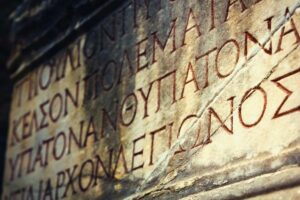Pre-publication excerpt from the introduction of the book “History of the Hellenic World” by Giorgos Kontogiorgis, released on 4 April by Armos Publications.
When the first edition of this History of Greece was published, it stirred mixed reactions and sparked widespread debate. It revealed that this was not the history of an ordinary people, but rather of a civilisation that moved through world history on entirely different terms—demanding new cognitive tools and a suitable methodological framework for its study. This new edition, continuing in the same direction, provides the intellectual and methodological means for the reader to form a comprehensive understanding of the Greek phenomenon, while also enabling meaningful comparisons with the wider world and, crucially, with our own era.
Previous histories of the Greek world have largely focused on external, emblematic features—events tied to what are perceived as its most significant moments: wars, civil strife, territorial expansion, prominent figures and leaders, language, cultural practices, contributions to philosophy, science, the arts, theatre, and so on. Depending on their ideological leanings, different schools of thought have emphasised particular periods of Greek history while rejecting or marginalising others, often with the aim of claiming ownership of the Greek legacy. Western scholars typically engage with early antiquity, Eastern thinkers with late antiquity, and others with select historical snapshots.
A third school of thought, advocated by the entrenched intellectual class of the Greek state, has gone so far as to sever modern Greek society from its historical roots. This approach seeks to mask the legitimacy crisis created by the imposition of Western-style absolutism upon the Greek world, disrupting its anthropocentric past and, indeed, its trajectory of progress.
These perspectives commonly begin their historical inquiry from the vantage point of modernity, projecting it as the universal benchmark against which all of world history is to be measured. Within this framework, the past is judged in terms of how closely it resembles modern ideals—praised when it aligns, dismissed when it diverges. The Greek past, in this context, is relegated to a “pre-modern” status—implicitly inferior.
This methodology helped foster the conviction within modernity that it represents the pinnacle of historical development, thereby placing itself beyond any meaningful comparison with the Greek past. As a result, comparative historical analysis has been limited to surface-level morphological differences within the modern era, and the scope of the social sciences confined to synchronic studies. Thus, history—beyond its anecdotal appeal—was effectively relegated to the margins of intellectual inquiry.
While this method poses few issues when applied to the despotic past of humanity or even to modernity’s own history, it proves wholly inadequate for understanding the Greek world. This epistemological obstacle was already apparent during the Enlightenment, when modern thinkers sought to make two major interventions in the Greek world’s self-conception in order to preserve space for their own epistemological model. First, they reinterpreted classical antiquity and its concepts; second, they severed the continuum of post-Roman Greek history. Through the first intervention, classical concepts were reframed in modern terms, obscuring their roots in earlier Hellenic developments. Through the second, Byzantine and post-Byzantine periods were suppressed in favour of positioning modern despotism as the supposed bridge between ancient and modern anthropocentrism.
In this interpretive framework, the polis—the foundational political unit of the Greek world—fails to meet the criteria of modern statehood. In its democratic form, it does not correspond to what modernity defines as a political system. Universal freedoms—individual, social, and political—are deemed inferior or even incompatible with the narrowly defined individual freedom of modernity. Democracy, if not outright dismissed as totalitarian (as it was by thinkers like Hegel and Kant), is confined to its most primitive forms, while constitutional or elective monarchy is paradoxically upheld as the hallmark of a democratic state. Likewise, the post-military (post-stratocratic) era of the Greek world and its cosmopolitan political structure—the cosmopolis—were expunged from the evolutionary map, often mischaracterised as despotic empires.
This book takes a different approach, grounding its inquiry in the universal framework of cosmohistory. It seeks to decode the unique nature of the Greek world and determine its rightful place within historical development. The key thesis is that the Greek world ushered humanity into one of the two fundamental components of the cosmosystem: the anthropocentric one—that is, societies based on freedom.
Hellenism was the living embodiment of this anthropocentric cosmosystem: a complex of politically and state-organised societies that developed across multiple historical phases, yet shared common horizons, internal coherence, self-sufficiency, consistent variables, ideological tensions, and value systems. It stands in contrast to the despotic cosmosystem, which encompasses societies where freedom is absent.
As a cosmosystem, Hellenism moved through cosmohistorical time in successive evolutionary stages, reflecting the developmental “biology” of anthropocentric life and, more broadly, of history itself. From this perspective, modernity is not an entirely new civilisation, but a continuation—albeit in its early stages—of anthropocentric development. While it represents a shift from the small-scale polis to the larger-scale nation-state, its current form corresponds to the early phase of anthropocentric maturity, analogous to the pre-classical era of the city-state.
The History of the Greek World
What makes the Greek world unique is that it has passed through the entire spectrum of anthropocentric development—unlike modernity, which is only just embarking on that journey. From its origins to the present day, Hellenism has displayed a cohesive anthropocentric unity, unfolding in two major phases: the state-centred (polis) and the ecumenical (cosmopolis). Through this continuity, the Greek anthropocentric model was transmitted to Europe, laying the foundations of modernity. At no point did the Greek world retreat into despotism.
Through the pages of this work, the reader will gain insight not only into the nature of the Greek world but also into the true character—and potential future—of modernity. That future, it seems, may be quite different from the one our contemporary era assumes.












